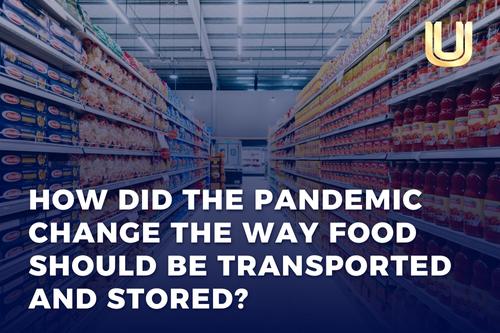Ambient Food in a Post-Pandemic World

Demand for food, as well as rapidly increasing freight costs and shortages of labor due to COVID-19 and its variants are creating new delays for processed food and fresh fruit companies, resulting in bare supermarket shelves at major retailers throughout the United States. Ambient foods may seem immune to the pandemic but the truth is that it is not. At least not completely.
The ambient temperature is generally considered to be 15° to 25°C. The term “ambient food” refers to “food that can usually be stored at room temperature.” They’re linked to both dry and wet canned goods, as well as glass bottles and jars. Their shelf life is longer. This covers everything from tea and coffee to canned vegetables, fruits, soup and more.
Processed foods are also classified as ambient products and can be kept for an extended period of time. Fresh milk, on the other hand, must be refrigerated. Fresh milk must be chilled while processed milk (long life, condensed, evaporated) may be kept at room temperature.
Following COVID-19, the supply chain industry is confronted with a complicated “new normal.” Now more than ever, the infrastructure and procedures that move food items from factory to consumer have been put to the test.
Covid-19 and Ambient Food
In terms of infection, there is little risk because coronaviruses are so fragile. As a result, they are highly unlikely to be transferred from food products or packaging that are transported at ambient, refrigerated, or frozen temperatures over a period of days or weeks
And what’s more, the food lasts longer and so pandemic delays are not as crippling in that regard. But, as the old saying goes, time is money. And delays are costing both manufacturers, producers and consumers money. So what are the effects of the pandemic on ambient food warehousing and transportation?
Ambient Food Transportation and Efficiency
Ambient food transportation, despite its advantages, rely, more than ever, on efficiency, expertise and accuracy.
Unilogic is a full-service warehousing and asset-based logistics provider that offers cross-docking services, Overweight dray, temporary storage, and fulfillment for ambient food shipping. Unilogic offers a multifaceted approach towards the handling of ambient food commodities. We design efficiencies and solutions in a time where many of these are essentially tied down with the delays that the pandemic has caused
Ambient food transportation is the process of transporting food that does not require refrigeration. This type of transportation is typically used for non-perishable items, such as canned goods, dry goods, and other packaged foods.
There are many benefits to using ambient food transportation, including the following:
Longer shelf life
One of the main benefits of ambient food transportation is that it allows food to have a longer shelf life. This is because the food is not exposed to extreme temperatures that can spoil the food or cause it to go bad.
Reduced costs
Another benefit of ambient food transportation is that it can help to reduce the overall cost of transporting food. This is because ambient transportation requires less energy and resources to maintain the proper temperature for the food.
Increased safety
Ambient food transportation can also help to increase the safety of food. This is because the food is less likely to be contaminated by bacteria or other harmful microorganisms.
Despite the benefits of ambient food transportation, there are some disadvantages to using this type of transportation. These disadvantages include the following:
Limited to non-perishable items
One of the main disadvantages of ambient food transportation is that it is limited to non-perishable items. This means that perishable items, such as fresh fruits and vegetables, cannot be transported using this method.
Unilogic solves this issue with a multi-channel approach in which we can find solutions for your perishable goods while directly managing your non-perishable shipments. Whatever the mode of transportation, we’ll ensure your shipment reaches where it needs to.
Requires careful planning
Another disadvantage of ambient food transportation is that it requires careful planning. This is because the food must be properly packaged and stored to ensure that it does not spoil or go bad during transport.
Again, we have the experience to ensure that your ambient food transportation solution is as optimal as possible. Our ambient food warehouses are fully equipped to receive, store, package, re-kit (if needed) and ship your ambient food as needed.
Post-Pandemic Ambient Food Warehouses Will Be In High Demand
It is predicted that ambient food warehouses will be in high demand post-pandemic. This is because many people are now aware of the importance of having non-perishable food items on hand in case of an emergency.
As a result, manufacturers and producers of ambient food products will need to have adequate storage facilities to meet the demand.
Unilogic is uniquely positioned to help manufacturers and producers with their ambient food storage needs. Our state-of-the-art warehouses are equipped with the latest technology and systems to ensure that your products are stored safely and securely.
We also offer a variety of value-added services, such as inventory management, pick and pack, and cross-docking, to help you maximize the efficiency of your operations.
If you are in need of ambient food storage solutions, contact Unilogic today. We’ll be happy to provide you with a tour of our facilities and answer any questions you may have

